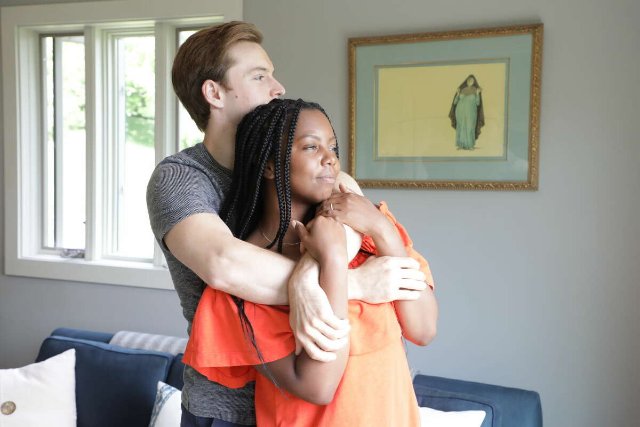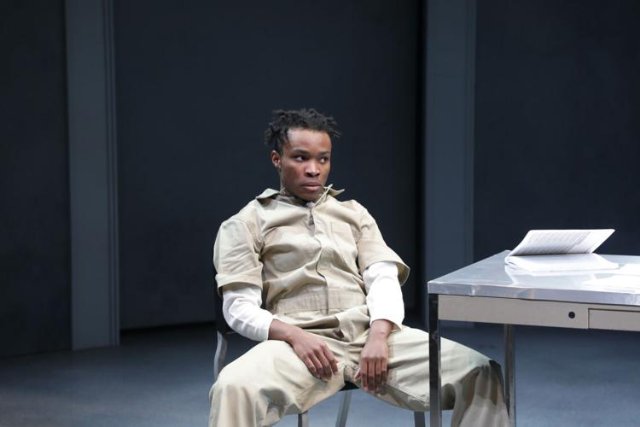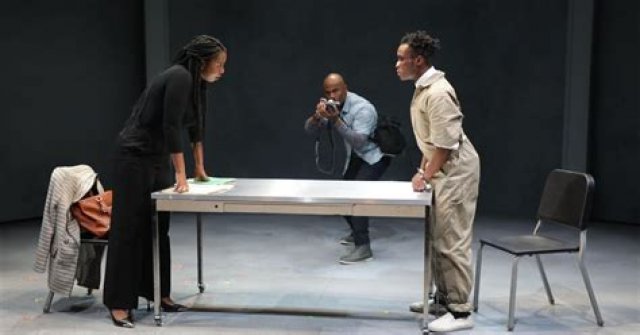B.R.O.K.E.N. Code B.I.R.D. Switching
World Premiere by Tara L. Wilson Noth at Berkshire Theatre Group
By: Charles Giuliano - Jun 26, 2022
B.R.O.K.E.N. Code B.I.R.D. Switching
By Tara L. Wilson Noth
Directed by Kimille Howard
Cast: Almeria Campbell (Evelyn Payne), Rebecca L. Hargrove (Katherine Morgan), Torsten Johnson (Mark Bennett), John Kearse (Owen Porter), Justin Sturgis (Deshawn Payne), DeAnna Supplee (Olivia Bennett)
Scenic designer, Baron E, Pugh; Costumes, Danielle Preston; Lighting, John D. Alexander; Sound, Michael Keck; Photographer, Jacey Roe Russell; Projection designer, David Murakami.
Berkshire Theatre Group
Unicorn Theatre, Larry Vaber StageJune 23 to July 9
Grants for the Arts, National Endowment for the Arts
World Premiere
The play B.R.O.K.E.N. Code B.I.R.D. Switching by Tara L. Wilson Noth, which is having its world premiere at Berkshire Theatre Group, opens with a brief bookmark.
So much so that you hardly notice. Yet a reminder of it well into the drama reveals that it is the fulcrum that unhinges the life and marriage of the successful lawyers Olivia Bennett (DeAnna Supplee) and Mark Bennett (Torsten Johnson).
She is barefoot and cradling a baby. In a flash that dissolves into a long white scarf that floats to the ground. Only later we learn of Lucy their deceased daughter. The loss of a child can bring a couple together through grieving. Or drives them apart which is the case here.
While that’s the primary point it’s one of several which proves to be as multi dimensional as attempting to solve a Rubik’s Cube.
The playwright has taken on a lot as the program notes state: Racism, incarceration, justice, and relationships. There can be turmoil trying to follow and resolve this mélange of subplots.
Then there is the matter of the play’s title which is in itself counterintuitive to comprehend. The notes inform us that “code switching is a linguistic term for switching between one language or another, or one dialect and another…changing in varying degrees how we speak, dress, act, and interact depending on the situation we find ourselves in or the audience we are addressing.”
This is a phenomenon of black culture particularly for individuals who through education or career success have progressed from one linguistic culture to another. Experiencing racism and misunderstanding in an upwardly mobile world there is an instinct to get back home to a secure place.
The documentary photographer, Olen Porter, or just Porter (Jahi Kearse) seems to socially level the successful and sophisticated attorney Olivia by constantly referring to her affectionately but demandingly as “baby girl.” She is neither, but going through a breakup with her rich and influential husband, finds respite in his flawed but homey persona.
Olivia is a tragic figure caught between two worlds. A graduate of Columbia Law School she has worked hard for material and social success. But after a birthday party gone wrong blurts out that their white privileged friends are racist assholes. Why didn’t you defend me she asks. “I didn’t think I needed to” he responds ineptly.
That’s a deal breaker but is Porter enough for her? I winced at his homilies and platitudes prefaced by “My mammy always told me that…” Reeling from Mark she had landed in Porter’s bed but quickly sees that as a dead end.
Then there is the matter of B.I.R.D. Switching about which I haven’t a clue.
While difficult to piece together there was much to like about this production which held our attention for some two hours with an intermission. Director Kimille Howard succeeded in keeping a flow with the often clichéd material at hand. The cast was uniformly excellent both individually and as an ensemble.
A particular shout-out goes to superb production values. Waiting for the play to start we contemplated a stark, minimalist set with grey walls and three doors. That was brilliantly transformed by the projection designs by David Murakami. With furniture and props we experience office, home, jail, and photo studio as well as establishing shots coordinated with seasonal shifts.
While things get messed up, just the nature of things, in Wilson Noth’s play there are no bad people. All of the characters are well intended but are dealt a bad hand.
An established corporate lawyer Olivia is approached by Evelyn Payne (Almeria Campbell) to take on the case of her son Deshawn (Justin Sturgis) who has been accused of murder. In a process that is not very credible Olivia argues that she does not do criminal law but, nevertheless, takes on the pro bono case.
Here the drama devolves into an all too familiar procedural. How many times have we seen an angry young man, falsely accused, willing to take a fall for a friend or family member?
He’s no angel as she unpacks a folder with his juvie rap sheet. Then, a turnaround. Living with his grandmother he has been an honor student, hard worker, and talented artist/ writer. He even recites a poem by Langston Hughes. There is a thumb on the scale as Deshawn is determined to throw his life away. “It’s a man’s duty to protect his family” he states emotionally.
As Olivia digs deeper things fall apart at home. Mark is all too willing to allow himself to be seduced by another glamorous, smart, ambitious black lawyer. Also a Columbia graduate Katherine (Rebecca L. Hargrove) in a catty manner mentions that she is a few classes behind Olivia. She offers Mark a younger, prettier, sexier version of his estranged wife. We wonder about her motivation and why Mark has slid into another biracial relationship. Particularly considering that he didn't handle it well the first time.
While this play doesn’t feel finished, given the plot premises, it’s hard to image what will tie up its loose ends. As of now, however, it provides an absorbing and thought provoking evening of theatre.




